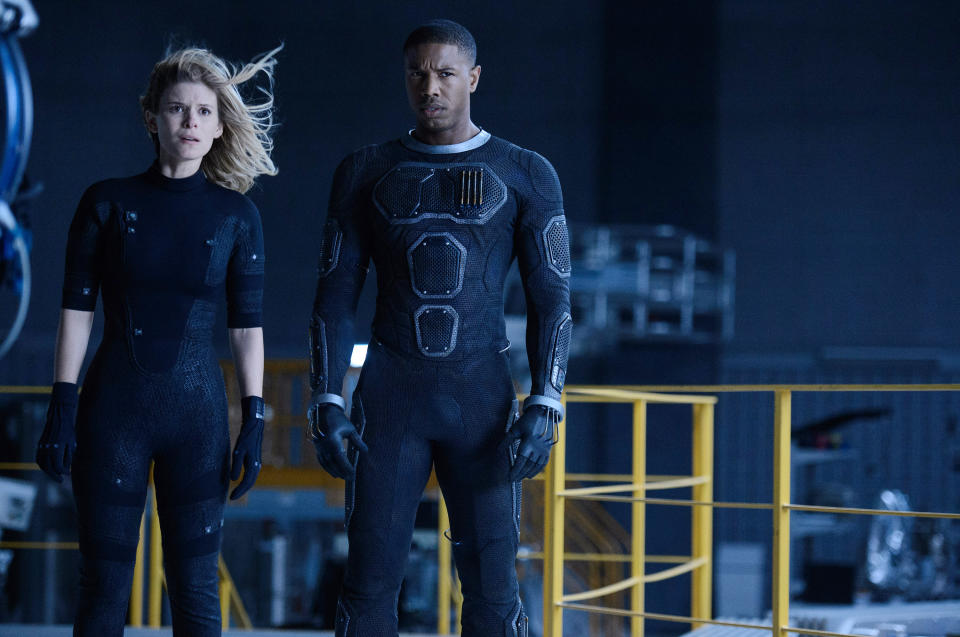'Fantastic Four' director Josh Trank regrets not fighting for a black actress to play Sue Storm: 'I feel embarrassed about that'
While Josh Trank’s ill-fated Fantastic Four reboot failed to create a new franchise for Marvel’s First Family, the 2015 movie was ahead of the comic book movie curve in at least one important respect. The writer-director made the bold choice to cast Michael B. Jordan — who had recently starred in Trank’s breakout directorial debut, Chronicle — as Johnny Storm aka the Human Torch, who had traditionally been depicted in comics and onscreen as a white character. (In fact, Jordan’s live-action predecessor was none other than future Captain America Chris Evans.) In a recent interview on the Geeks of Color podcast, The Meaning Of, Trank revealed that he had similar intentions for Johnny’s sister, Sue Storm, and their father, Franklin. “I was mostly interested in a black Sue Storm and a black Johnny Storm and a black Franklin Storm,” he said.
In the end, Trank successfully cast Jordan as Johnny and veteran character actor Reg E. Cathey as Franklin. (Cathey died in 2018.) But on the podcast, he claimed that executives at 20th Century Fox — which owned the rights to Fantastic Four prior to being purchased by the Walt Disney Company — prevented him from choosing a black actress as Sue. “I found quite a bit of heavy pushback on casting a black woman in that role.” The director and the studio eventually agreed on House of Cards star Kate Mara as Sue, who is described as Johnny’s adopted sister in the film.

In interviews at the time, Trank described how casting Jordan and Mara as siblings spotlighted the diversity of contemporary families. “I have mixed family in my own family, and it’s something that isn’t out of the ordinary anymore, but we don’t really see it portrayed in the casual reality of the movies,” he told Collider in 2015. “That’s something I felt that would be interesting and challenging, to have mixed siblings.” Reflecting on the experience on The Meaning Of, though, he framed his concession to Fox as more of a personal failure.
“When I look back on that, I should have just walked when that realization sort of hit me, and I feel embarrassed about that, that I didn’t just out of principle,” Trank said. “Because those aren’t the values I stand for in my own life. Those weren’t the values then or ever for me. Because I’m somebody who always talks about standing up for what I believe in, even if it means burning my career out. I feel bad that I didn’t take it to the mat with that issue. I feel like I failed in that regard.”
Had Trank pressed Fox on casting a black actress for Sue Storm, he likely would have had a key creative ally on his side: Stan Lee, the Marvel Comics icon and creator of the Fantastic Four. When the director spoke with Yahoo Entertainment last month prior to the release of his latest film, Capone, he recalled how Lee enthusiastically endorsed his decision to cast Jordan. “I said, ‘I think Michael B. Jordan is the best actor for this character, but I can see that there might be backlash from certain fans.’ And he said to me: ‘Who cares about what they have to say? That’s really inspired casting — I love it.’ That’s why Stan’s an icon. He was a timeless figure of inclusiveness and open-mindedness.”
In the years since Fantastic Four, the Marvel Cinematic Universe has made a point of increasing the diversity of its superhero citizenry. Popular characters like Flash Thompson and Valkyrie are played by actors who don’t resemble their traditional comic book counterparts. Jordan, meanwhile, went on to star in Black Panther — one of the studio’s top-grossing movies — and has publicly challenged Hollywood at large to commit to diverse casting. “I use my power to demand diversity, but it’s time the studios and agencies and all these buildings we stand in front of to do the same,” he remarked at a Los Angeles demonstration protesting police brutality on Saturday. “You committed to a fifty-fifty gender parity in 2020. Where is the challenge to commit to black hiring? Black content led by black executives, black consultants? ... Let us bring our darkness to the light.”
Read more from Yahoo Entertainment

